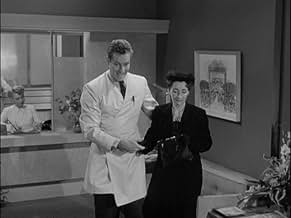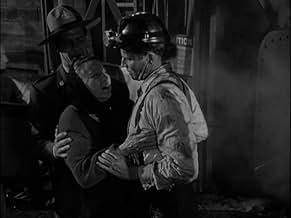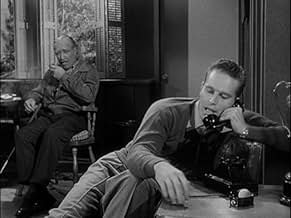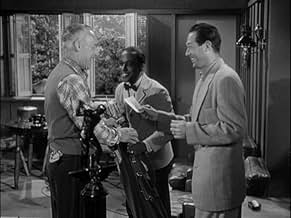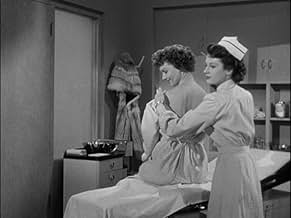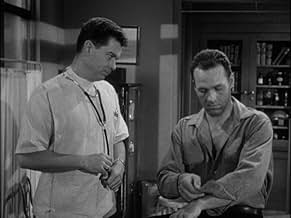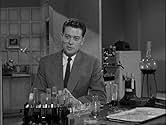CALIFICACIÓN DE IMDb
5.8/10
1.1 k
TU CALIFICACIÓN
Un médico que regresa de la Guerra de Corea a su ciudad natal en Pensilvania debe decidir qué hacer con su vida.Un médico que regresa de la Guerra de Corea a su ciudad natal en Pensilvania debe decidir qué hacer con su vida.Un médico que regresa de la Guerra de Corea a su ciudad natal en Pensilvania debe decidir qué hacer con su vida.
- Dirección
- Guionistas
- Elenco
Philip Ahlm
- Minor Role
- (sin créditos)
Elsie Baker
- Mrs. Olzoneski
- (sin créditos)
Mary Benoit
- Party Guest
- (sin créditos)
Opiniones destacadas
This film is an 83 minute sermon on selflessness vs selfishness, with particular emphasis on the medical profession. The dialogue is full of grandiose turns of phrase that often mean nothing and do not advance the plot. No one's acting stands out because almost everyone is playing a one-dimensional type.
Charlton Heston stars as the only character with any choices to make or an arc to follow. At the start of the story, he plays a skilled military surgeon on leave after the death of his brother. He is initially content to remain in the army where he has been doing good. However, immediately upon arriving in his old hometown, he is offered two positions in private practice. One serving the poor for little pay, one coddling the wealthy for big bucks. He doesn't even have to think about it. Lizabeth Scott plays his new girlfriend, although there is no chemistry between them at all. They both profess their love for the other, but his interest in her seems to be her rich friends, her interest in him is his status as the current fashion.
In case Heston's "bad choices" are not obvious enough, another young doctor and a nurse who both care more about people than money are provided for contrast. Both came to town because they were so impressed by Heston when he was a "real" doctor while in the army. Could that mean he might yet choose the right path?
Finally, to underline the film's version of right vs wrong choices even further is Mildred Dunnock as Heston's mother. She proudly lives in poverty and is distressed that her two sons both preferred a wealthy lifestyle and the corrupting influence of rich women. Neither of her sons appear to have done anything to help out their mother, not for any reason explained in the script, but just because for the sake of the film, everyone must be identified as poor or rich.
Subtle this script is not. Once everything is set up for us, with all the "correct" choices clearly flagged, the rest of the film is just following a predictable path (with some nonsensical speeches) until Heston reaches all the right conclusions.
Charlton Heston stars as the only character with any choices to make or an arc to follow. At the start of the story, he plays a skilled military surgeon on leave after the death of his brother. He is initially content to remain in the army where he has been doing good. However, immediately upon arriving in his old hometown, he is offered two positions in private practice. One serving the poor for little pay, one coddling the wealthy for big bucks. He doesn't even have to think about it. Lizabeth Scott plays his new girlfriend, although there is no chemistry between them at all. They both profess their love for the other, but his interest in her seems to be her rich friends, her interest in him is his status as the current fashion.
In case Heston's "bad choices" are not obvious enough, another young doctor and a nurse who both care more about people than money are provided for contrast. Both came to town because they were so impressed by Heston when he was a "real" doctor while in the army. Could that mean he might yet choose the right path?
Finally, to underline the film's version of right vs wrong choices even further is Mildred Dunnock as Heston's mother. She proudly lives in poverty and is distressed that her two sons both preferred a wealthy lifestyle and the corrupting influence of rich women. Neither of her sons appear to have done anything to help out their mother, not for any reason explained in the script, but just because for the sake of the film, everyone must be identified as poor or rich.
Subtle this script is not. Once everything is set up for us, with all the "correct" choices clearly flagged, the rest of the film is just following a predictable path (with some nonsensical speeches) until Heston reaches all the right conclusions.
A freshly discharged army doctor passes up practice in blue-collar hometown for big- paying practice among a city elite that includes a cool blonde dilettante.
I got this epic as part of a package claiming to be all noir. The only thing noir in this movie are the several night time shots— otherwise, no crime, no hand of fate, and no moody atmosphere. Only blonde seductress Helen (Scott) instead, and she's hardly the standard spider woman. Actually, the movie's more b&w soap opera than anything else.
That's not to say there're no redeeming features. I guess I wasn't aware of what a racket doctoring among the wealthy can be. The movie shows what a cushy pandering job it can be, treating headaches with high-priced medicines and smarmy words. And coming from a muckraker like novelist McCoy, e.g. They Shoot Horses Don't They (1969), I take it as factually based.
And surprise, surprise, to me, at least—actor Heston is quite animated as the sell-out doctor. I guess this was before he stiffened into a big-screen movie god, but whatever, he's quite persuasive in the role. Still, I thought the script made the doc's transition from honorable soldier to money-grubbing pill pusher much too easy, more like a movie device than a character change. Nonetheless, get a load of the coal mine scenes, quite realistic and well done.
But, bottom line, the story follows a familiar pattern with no surprises, suggesting a production serving mainly as a vehicle for Columbia's newest hunk.
I got this epic as part of a package claiming to be all noir. The only thing noir in this movie are the several night time shots— otherwise, no crime, no hand of fate, and no moody atmosphere. Only blonde seductress Helen (Scott) instead, and she's hardly the standard spider woman. Actually, the movie's more b&w soap opera than anything else.
That's not to say there're no redeeming features. I guess I wasn't aware of what a racket doctoring among the wealthy can be. The movie shows what a cushy pandering job it can be, treating headaches with high-priced medicines and smarmy words. And coming from a muckraker like novelist McCoy, e.g. They Shoot Horses Don't They (1969), I take it as factually based.
And surprise, surprise, to me, at least—actor Heston is quite animated as the sell-out doctor. I guess this was before he stiffened into a big-screen movie god, but whatever, he's quite persuasive in the role. Still, I thought the script made the doc's transition from honorable soldier to money-grubbing pill pusher much too easy, more like a movie device than a character change. Nonetheless, get a load of the coal mine scenes, quite realistic and well done.
But, bottom line, the story follows a familiar pattern with no surprises, suggesting a production serving mainly as a vehicle for Columbia's newest hunk.
The splendour of this film is the outstanding dialog, which is enjoyable and intelligent all the way, in all its turnings around about ethics, conscience, ambition, vocation and the difficult question of what is right. Lizabeth Scott is not bad, she is just beautiful and charming and irresistible and can't do without her life in luxury at the top, and when she wants Charlton Heston to have the same she only means well. But Charlton is a doctor here with some experience out of two wars, the world war and the Korea war, and he finds life at the top somewhat difficult to adapt to with all its cocktail parties, rich patients of hypochondria, glamour and luxury, which just doesn't fit into what he has been brought up to. The film has been compared to Cronin's "The Citadel", and it's a good comparison, Cronin could have written this story, but it is still sharper and more poignant, as the condition of the coal miners play an important part here, although not quite as great as in "The Stars Look Down", which is also worth remembering in this context. The acting is superb, Ray Collins has an important part, and the ending is without upsets. It is all logical and natural, and Charlton Heston remains as admirable as Lizabeth Scott remains as beautiful as ever.
Bad for Each Other (1953)
Charlton Heston gets a bad rap sometimes--maybe that's what you expect after "Planet of the Apes"--but here he is the charming, confident, larger than life young man that made him famous. Yes, it's a B-movie, but it's a very strong performance for Heston and he is surrounded by a cast that is decent (Lizabeth Scott not at her best, which is saying a lot) to terrific (Ray Collins as the big business power guy he plays so well). The "business" at the center is a coal mine in a small Pennsylvania town, and Heston plays a doctor, Tom Owen, getting out of the military in a pseudo-noir kind of echo. Owen's dilemma is a worldly one--whether to doctor rich old women with frivolous pains or to work for the miners in their lower class afflictions.
And it is Lizabeth Scott, a pampered (and unabashedly pampered) rich girl who snags our hero, and so against his initial instinct Heston goes the rich and lazy way. But of course the coal mining town is all around him, and reminders pop up now and then. It's a great problem for a movie, and it's worked out with fairly predictable logic, so there is nothing to really fault here. Except that very predictability. Even Scott is a bit bland, not really getting to run her coolness to true ice. Some of the side characters are well developed, surprisingly (a "good" doctor untainted by money and an old woman who is wiser than she lets on at first), and director Irving Rapper (who should have been a music star in the 1990s with a name like that) makes it pop pretty well.
The less than sterling reputation of this movie is unwarranted, but it may be a result of higher expectations than this kind of movie deserves. Yes, the plot is boilerplate stuff, but so are half the movie plots out there. And Heston is sort of terrific. Yes, he plays a type, and he doesn't give the angst some other actor might, but I don't think the character, Dr. Owen, was an angst-y kind of guy. The way he wrestles with things is believable.
The cinematography by Franz Planer is better than I'd expected (the name didn't ring a bell) and there are small sterling moments, the camera moving around a group of people at a table, or across a wrought iron screen as the two leads start to hit it off. Nice stuff. The title is wrong, by the way--it's only Scott's character who is bad for the doctor, not the other way around. She's not about to be affected by anyone, especially a handsome young ex-GI who is such easy prey.
Charlton Heston gets a bad rap sometimes--maybe that's what you expect after "Planet of the Apes"--but here he is the charming, confident, larger than life young man that made him famous. Yes, it's a B-movie, but it's a very strong performance for Heston and he is surrounded by a cast that is decent (Lizabeth Scott not at her best, which is saying a lot) to terrific (Ray Collins as the big business power guy he plays so well). The "business" at the center is a coal mine in a small Pennsylvania town, and Heston plays a doctor, Tom Owen, getting out of the military in a pseudo-noir kind of echo. Owen's dilemma is a worldly one--whether to doctor rich old women with frivolous pains or to work for the miners in their lower class afflictions.
And it is Lizabeth Scott, a pampered (and unabashedly pampered) rich girl who snags our hero, and so against his initial instinct Heston goes the rich and lazy way. But of course the coal mining town is all around him, and reminders pop up now and then. It's a great problem for a movie, and it's worked out with fairly predictable logic, so there is nothing to really fault here. Except that very predictability. Even Scott is a bit bland, not really getting to run her coolness to true ice. Some of the side characters are well developed, surprisingly (a "good" doctor untainted by money and an old woman who is wiser than she lets on at first), and director Irving Rapper (who should have been a music star in the 1990s with a name like that) makes it pop pretty well.
The less than sterling reputation of this movie is unwarranted, but it may be a result of higher expectations than this kind of movie deserves. Yes, the plot is boilerplate stuff, but so are half the movie plots out there. And Heston is sort of terrific. Yes, he plays a type, and he doesn't give the angst some other actor might, but I don't think the character, Dr. Owen, was an angst-y kind of guy. The way he wrestles with things is believable.
The cinematography by Franz Planer is better than I'd expected (the name didn't ring a bell) and there are small sterling moments, the camera moving around a group of people at a table, or across a wrought iron screen as the two leads start to hit it off. Nice stuff. The title is wrong, by the way--it's only Scott's character who is bad for the doctor, not the other way around. She's not about to be affected by anyone, especially a handsome young ex-GI who is such easy prey.
Charlton Heston ("Col. Owen") returns from almost ten years as an army surgeon to his Pennsylvania home to find that his dead brother has been accused of sloppy practices that caused fatalities at a coal mine. His mother (Mildred Dunnock) and local doctor "Scobee" (Rhys Williams) hope he will stay and help the local community, but he discovers that his late brother had run up quite a bit of debt and determines to pay it back. A chance meeting with the "Helen" (Lizabeth Scott) - the daughter of the man who holds the debt - introduces him to new opportunities. She is wealthy, twice divorced, and well connected. His quick thinking after an incident at a party sees an association with prominent, and rather venal, doctor "Gleeson" (Lester Matthews) offer him a route to success and prosperity. Along the way, he proposes to "Helen" and all looks set fair. Much of this film takes a swipe at the hypochondriac patients - mostly wealthy women - and at the physicians who are little better than charlatans; charging a small fortune for glorified Alka Seltzer. Will "Owen" continue to be satisfied with this increasingly unfulfilling existence or will his innate instincts developed during wartime send him back to tend to the more legitimate and urgent needs of the community at large? Heston is a bit on the wooden side here, he delivers his dialogue rather stiltedly and without much passion. Scott is adequate - but more as an effective conduit for the decisions the doctor might make, and there is a decent, if sparing, contribution from Dianne Foster as the voice of reason in the man's increasingly conflicted life - and not just professionally, either. It's way too wordy but it does offer food for thought about practices that probably still exist today and is a bit better than I was expecting.
¿Sabías que…?
- TriviaAccording to December 1950 articles in The Hollywood Reporter and the Los Angeles Times, producer Hal B. Wallis purchased the rights to the novel before it was published for $100,000 ($1.3M in 2024). Wallis intended the leads to be Burt Lancaster and Patricia Neal and that the project was to be filmed at Paramount. It never got off the ground, and Wallis ended up selling the rights to Columbia in early 1953.
- ErroresThe beginning scenes of movie show coal mine operations in Coalville, PA. The railroad caboose was from ATSF (Atchison, Topeka, and Santa Fe). That railroad never had operations in Pennsylvania.
- Citas
Dr. Tom Owen: [on the phone with his wife] Oh, I'm interviewing nurses, of course... Don't be silly, darling - of course she'll be fat and ugly. I do insist on good legs, though.
Selecciones populares
Inicia sesión para calificar y agrega a la lista de videos para obtener recomendaciones personalizadas
- How long is Bad for Each Other?Con tecnología de Alexa
Detalles
- Tiempo de ejecución1 hora 23 minutos
- Color
Contribuir a esta página
Sugiere una edición o agrega el contenido que falta

Principales brechas de datos
By what name was Bad for Each Other (1953) officially released in India in English?
Responda
